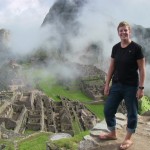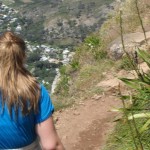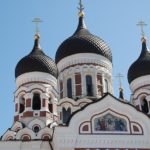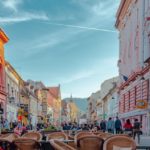Traveling the Unknown: Part II
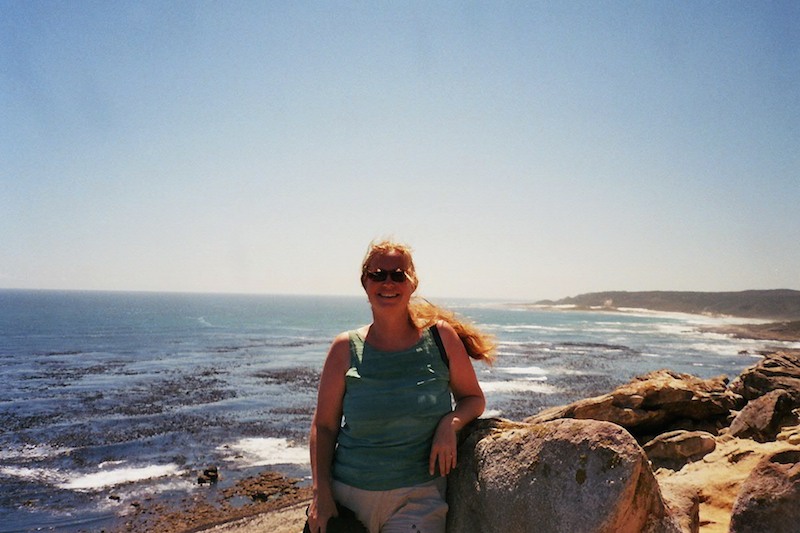
Journey to South Africa
This is the second part of a two-part series. Read the first part here.
II – Down South
There are lessons you don’t learn the first time. Adding fractions, French higher vocabulary, and why you should wear warm underclothes before you actually catch the flu. To take care, as a Kenyan woman told me one night and as all of my American friends remind me whenever we part, is a lesson I need to practice. Even though it is just a common phrase, a different way of saying goodbye, different in putting the responsibility for a safe trip on you instead of some guardian angel or luck—it rings in my ears. I also say it to friends meanwhile, to my Persian sister for instance when she goes to Iran where she is in danger because she is a native, not because she’s a stranger.
She is a stranger but rather safe in Berlin. When she visits her family back home or what was her home, she has to take care where she goes and with whom she speaks.
I am a stranger nearly everywhere. And I feel at home easily everywhere, as soon as I meet warm people, get to taste new food, and—what really hooks me—can jump into the sea from a nice, unknown beach. Well, the thing about warm people is not quite accurate. Most of the times, I meet them after I have made myself feel at home. You find them once you decide to become part of them, to try to speak their language, even if you know only four words in their actual mother tongue, even if you use a third lingua franca to communicate—you may discover that they know something you’ve been looking for all your life and that they understand you better than many people who use the same words in a faraway land you are supposed to call home.
Thus, I found wonderful people, friends as I may call some of them, in East Timor, Chicago, and Israel. In Berlin, my hometown. And in Ethiopia, Morocco, and Kenya. I went to South Africa to do just the same.
I am a stranger nearly everywhere. And I feel at home easily everywhere, as soon as I meet warm people, get to taste new food, and—what really hooks me—can jump into the sea from a nice, unknown beach.
This time I traveled alone, and I was planning to see a guy I had met online. No no, not that kind of online acquaintance—it was a business contact, I thought, he was a professional storyteller (writing this down it sounds weird even to me) and a workshop facilitator for companies, as far as I knew from his websites. I had read some of the materials he had posted and wanted to learn more about corporate narrative and how they used it to support the peace process in post-apartheid South Africa. Originally I had wanted to participate in a workshop; however there didn’t happen to be any in January 2010 and never, in fact, for individual learners (you have to bring a team from the same company).
Instead, he invited me to his home. Just like that, an email contact he had never met in person. He offered me to stay with him for a few days, in his house, so he wrote, with his wife and three children so we could speak. By then, we had exchanged a lot of long emails—oh yes, I know how this sounds, it’s exactly the kind of thing I tell my godchildren not to do, never, especially the girls. Still—we had exchanged intense emails about my work and anxieties and his rather disquieting questions concerning my professional role as a social work manager.
… would you say that Britta loves and accepts herself unconditionally?
… yes, I do – I am a religious person, so I know I am loved unconditionally. However, I really wonder where this is heading and if this is near any of the questions I have raised.
… I think so-ultimately this is about accepting all of yourself- the wonderful aspects and also the not-so-wonderful aspects (the dark side) which is actually the aspect of you that allows you to manage and lead people…
… ?? the dark side allows me to lead people?
I knew the man on the other end of the line had picked up on my growing discontent with the power games I had to fight instead of being able to encourage and mentor my colleagues. But I didn’t know after all if he really existed and if he was who he pretended to be. Maybe this was just some smart guy’s trick. (So this is most certainly no story I would ever tell my godchildren, or my mother. And maybe I shouldn’t even tell you…)
When I arrived in Johannesburg, everything was different. Even when I travel alone, and I’ve done it a lot, I try to immerse myself in everyday local life: I take the bus, I ask people for directions, I eat street-food and find my way through traffic and crowds. Not so in Jo’burg.
The hostel I had booked for a few nights until my internet friend would be available, clearly informed their guests that they would be picked up, no matter what—a luxury I appreciated coming from a 24-hour flight; however, this was no special service, it was a mere security measure. During my check-in they told me they’d do the same for each tour I wanted to undertake, and that I shouldn’t go downtown, in no event. Stay out of the city center by all means. One call and they’d be there to pick me up from the mall, the cinema, the bank, or wherever. I had just passed an iron gate three meters high with two watch dogs barking, and I hadn’t seen a single unfenced home on the way from the airport, so I took it as it was. The dogs sniffed my legs to get acquainted with the new guest, and the gate was closed with a heavy, metallic sound.
The next day, I went to Soweto. The hostel hired a driver and guide for me, a short black guy with lots of energy and a great sense of humor. Before we headed out to Soweto, he took me on a tour through Jo’burg. He showed me which high rise has the best view of the city, but you had to make sure not to walk through the downtown area to get there—here we are, by the way (he locked the doors), look outside, do you see a single white person? I am showing you this, he said, so you get an impression, but never go here by yourself: This used to be the bustling center of the city, but there is poverty and crime now all over, so never ever come here, you wouldn’t last ten minutes—and on we went, to Soweto. There he unlocked the doors.
Soweto turned out to be a tourist hub. We parked the car and walked along sunny streets, amidst dozens of people. We visited monuments and sights—well, I did, he smoked outside in the meantime, except for Regina Mundi, Soweto’s famous church that had played a crucial role in South Africa’s black peoples’ fight against apartheid. There, he entered with me, walked around, started talking with people, sat down for a while…
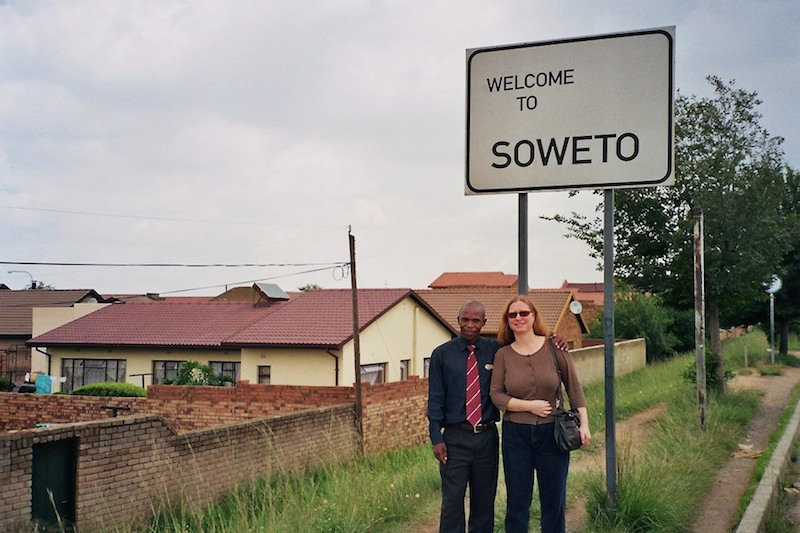
Then, we strolled up to a restaurant for lunch, and I was still puzzled by how easy and normal everything seemed, as opposed to Jo’burg and especially here, in this landmark of a bloody history.
When I came out of the Apartheid Museum later, I found him chatting with a mixed couple—Cameroonian and Dutch or Polish—who had asked him for the way to some place of interest. He offered to take them along on our tour, just for the fun of it (he liked these guys and particularly the fact that they were a mixed couple: they are a symbol of the future, he told me). So they followed us in their car to a township where we visited private homes and I was glad to have these other tourists with me. The husband knew exactly how to enter the dark huts, and how to break the awkward silence with a smile and a handshake that was almost a hug, respectful and warm at the same time. He spoke of his own family in Cameroon, and he knew when to give a tip and how much in the end; and I thought that my guide had been really smart.
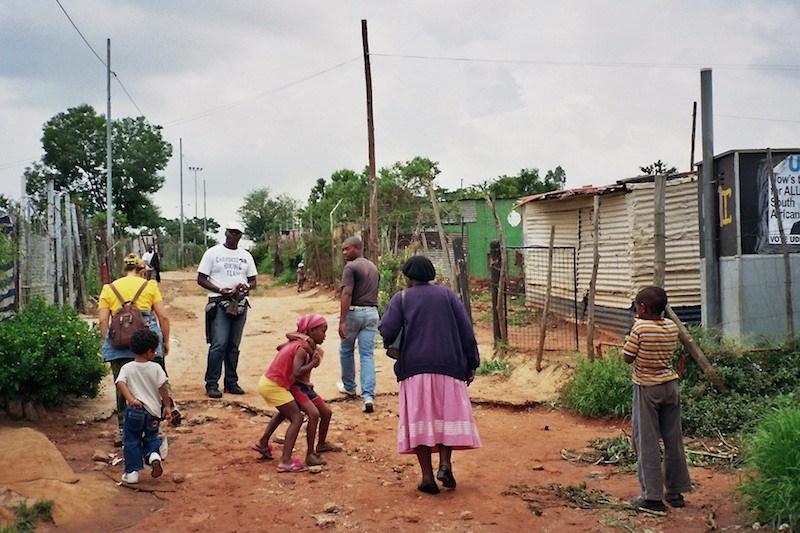
Back in Jo’burg, I had to do some grocery shopping, in a small supermarket three blocks from the hostel. Yes, I’m still here, time freezing around me. You may wonder what will happen with the internet guy, and so did I; but I wouldn’t find out until he was back in town. So I googled him, night after night in the hostel. In the meantime, I ran errands. And remember, there is no meantime in Africa, there is only time. Time that fills itself and all my errands with meaning.
The neighborhood wasn’t particularly dangerous, they told me, but I had noticed high stone walls around each and every house here too and dusk was drawing near. So I asked the girl who worked in the kitchen if she would come along to do her shopping with me. That’s how this city started to work on me. I sat in my room, planning when and how to leave the hostel: with a guide, with the kitchen girl, by myself only in the hostel’s car; and if I didn’t have to go out I stayed put, behind the three meters high iron fence, swimming in the small pool at the backyard from where you had a stunning view onto the center of Jo’burg, the unapproachable city.
On Sunday, I went to a small church two blocks from the hostel and, as advised by a note on the white board there, I took my handbag with me when I left my seat for the Lord’s Supper. I had never done this in a church before, as I had never spent time in a foreign place without visiting it all over. The church had mainly East Asian members, non-natives like me, and during coffee-time after the service, when people said Hi and asked me who and how I was, I already felt a bit at home. But I had to leave Jo’burg the next week, so there wasn’t much time left to get into trouble anyway. Or so I thought.
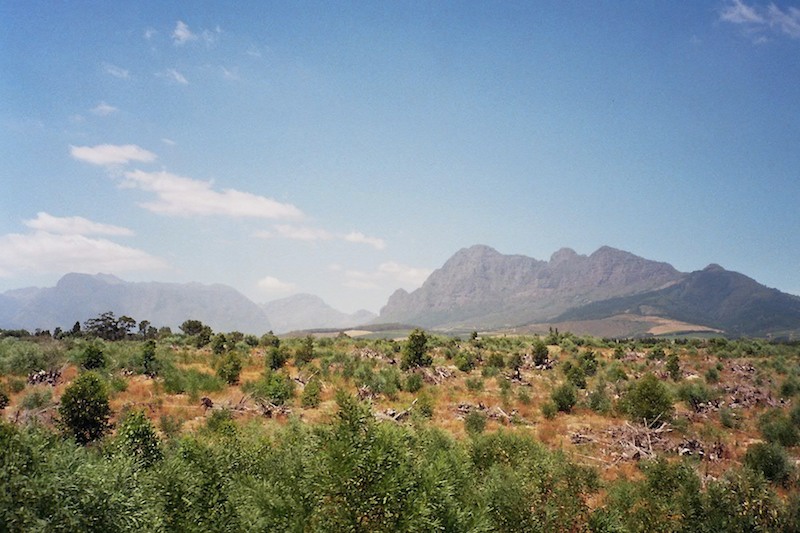
One of my errands would lead me to the mall to buy tickets for the train from Jo’burg to Cape Town. The 26-hour ride is famous for its spectacular views of different landscapes across South Africa, so I wanted to take it after visiting my yet unknown internet friend. The hostel’s driver dropped me off at the mall where I found out that I had to go to the central station for the tickets. I asked around and got different directions. I walked up and down, crossed the street back and forth, understanding less and less with every answer. Finally I took a minibus taxi in front of the mall, and I thought I had asked for the right one, but there seemed to be several with the same number going in different directions or with different numbers going in the same direction—anyhow, I got into one of them that seemed right.
It was. Or not really. Squeezed in between passengers on the rear bench seat, I tried to get a glimpse of the neighborhoods we passed. Where exactly were we going? How would I know when to get off? After a while, I started to recognize something—but not just anything: these were streets I had seen out of a locked car. I looked left and right, I turned back to the rear window. No doubt. This was the city center. I peered around: my guide had been right—not a single white person outside the bus—nor inside. I was right downtown. Despite the general heat, the woman and the man sitting to the left and right of me must have felt how I started sweating. I thumbed through my map, trying to find street names as best as I could in a minibus crammed with people.
I don’t remember if anyone talked on the bus, but I assume they did. I didn’t hear anything. A sticky cloud surrounded my head, pressing into my ears.
The voice of the man at my right cut through the droning silence: Where do you need to go?
He had short hair and friendly eyes. When we left the bus at the terminus, I saw that he carried a bag with books. It was the right bus, he said and promised to show me the way as I still couldn’t see the station. We stood in front of a street market—a bustling place that I would have loved to stroll along, but something told me it wasn’t safe. My guide led me through, quickly since he had to go to work and our detour wasn’t exactly on his way, and he walked me into the station, where he wouldn’t leave me before we had found the right ticket office, learned that I couldn’t pay with my credit card, searched for a cash machine, withdrawn money (I withdrew it, he waited at a certain distance, making sure nobody would come close to me), gone back to the ticket office, and purchased a wonderful, blue-and-white sleeper ticket for the next week. Then my new friend—we had talked all the time, about literature and other things I don’t recall –walked me up to a giant parking deck on the roof where I called the hostel and he said goodbye when we saw their pick-up van arriving.
I had lasted for more than one hour.
You may take care, but at the end of the day, you must—and you actually can—trust people.
Did he say goodbye or take care? I can’t remember. But I learned my lesson that day, even though everything went well in the end. I still trembled from my carelessness—and yet, even more I trembled from the awareness dawning on me that you can’t hold on to security yourself. You need to trust people. You may take care, but at the end of the day, you must—and you actually can—trust people.
I know I was probably very lucky, all those times strangers helped me out of fraught situations, but to this day, I think, I haven’t yet been in a dangerous place. Wherever I came and however seriously I was warned, I always met people who took care of me in such a way that I wouldn’t see any of the perils they knew of. People who turned the scariest locations into warm places, people you can find—or who find you—all over the world. This might not be the lesson I should have learned (certainly not what my mother would want me to memorize as taking care), but it is the highest level of security I can reach.
So, the next morning, I stood at the iron fence waiting for my internet friend to pick me up. I hadn’t found anything on Google contrary to what he’d claimed businesswise, but also not the tiniest indication of a wife and family. Finally, I had sent an email to my best friend asking her to call the police if she didn’t hear again from me within two days. Yes, I sure know how to take precautions.
I peeped through the bars, asking myself if I should really do this. He was late. He wasn’t a storyteller, probably, or in a very different sense. He had no family. He would—
A black car arrived, a slim man with fair hair reached out his hand through the bars to say Hi. The guy at the hostel reception unlocked the gate, shrugging at me (I sensed) after he’d watched me waiting all morning and now saw me go with somebody I obviously didn’t know. I put my luggage into the trunk and sat down in the car. He started speaking while we were driving, about the summer weather and about Berlin which he knew… but I could only breathe out after we reached his house, within a wildly flowering garden, with two friendly dogs, and his kids’ musical instruments filling the air with sound.
Asking about my travels, he prepared rooibos tea, explaining how to make it the South African way; and then he brought me to his mother’s house in the same garden where I stayed since she had more space than he and his wife with the children, his office, and work sheets and books in every room. Having breakfast on her terrace, I observed birds with his mother during three wonderful mornings, wild birds with long beaks that would come to sit on branches she had put up for them, feeding and playing with each other, fearless and confident in our presence until I would pick up my camera to try to keep hold of them and clicked them away.
Johannesburg


